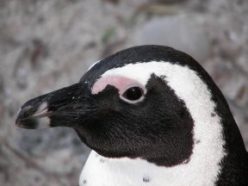Odor-chasing penguins
Penguins may use their sense of smell to locate food in the ocean.
The smell of rotten eggs probably makes you cringe. But, for penguins, this smell might mean there’s a meal nearby.
New research shows that penguins are attracted to this rotten-egg smell and probably use it when foraging for food in the ocean. The study is one of the first to show that penguins have a functioning sense of smell.
 |
|
An African penguin. Although penguins can be smelly, they aren’t known for a keen sense of smell. New research suggests that they might be able to detect certain odors to locate food.
|
| Courtesy of Gregory Cunningham |
The rotten-egg smell is caused by a gas known as dimethyl sulfide. Scientists already knew that some seabirds, such as albatrosses and petrels, use this smell to locate areas where tiny sea creatures called phytoplankton live. Phytoplankton produce the chemical, fish eat the phytoplankton, and the birds, in turn, swoop down to eat the fish.
Even though penguins don’t fly, they do swim along the surface of the water and dive to catch fish. So biologist Gregory Cunningham of Swarthmore College in Pennsylvania wondered if penguins might use the same trick.
“Seabirds like petrels and penguins have to solve the same problems, so it seemed likely that they would utilize the same techniques for solving those problems,” Cunningham says.
To test this, Cunningham built a Y-shaped structure. One branch contained the smell, while the other branch was odorless. A penguin sanctuary in Cape Town, South Africa provided the participants: African penguins recovering from being caught in oil spills. Cunningham plopped the penguins down in front of the structure one by one and watched in which direction they went. The penguins made a beeline for the smell.
Next, Cunningham visited a colony of wild African penguins living on Robben Island, located off the coast of Cape Town.
 |
|
A colony of African penguins.
|
| Courtesy of Gregory Cunningham |
“Penguins have this really cool system where they build nests anywhere they can,” Cunningham says. “All the nests have walkways down to the beach that form penguin highways.”
Cunningham doused various places along these penguin highways with the rotten-egg smell and observed the birds’ behavior as they passed by. He predicted that the penguins would be attracted to these spots in the morning when they were hungry.
Actually, the opposite happened. The penguins ignored the smell in the morning, but stopped to check it out on their way back to their nests in the evening.
Cunningham says he doesn’t know why the birds disregarded the smell at sunrise. But, he hopes that future research will uncover the answer, as well as shed more light on how penguins use smell in other aspects of their lives.







